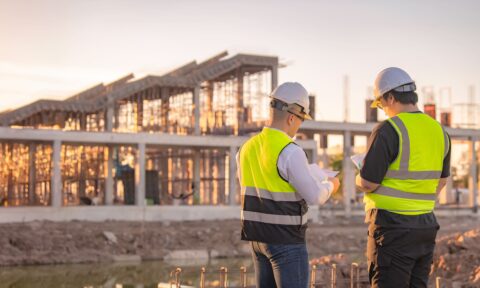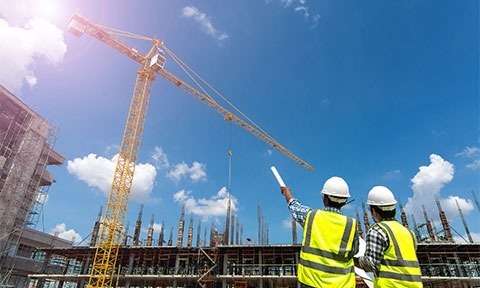Offshore Floating Structures Design – Dubai
- Offshore Floating Structures Training covers environmental loads and structural responses.
- The course delves into buoyancy, stability, and mooring systems.
- It explores tanker-based FPSOs, semi-submersibles, and jack-up designs.
- Participants learn about mooring systems, dynamics, and structural responses.
- The training provides in-depth knowledge on offshore structure design.
Overview
The Offshore Floating Structures Training course focuses on educating participants about the environmental loads and motions affecting offshore structures. The program covers topics such as buoyancy, stability, structural responses, mooring systems, FPSOs, semi-submersibles, and jack-up designs. Led by industry experts, the course aims to enhance understanding of design principles, operational requirements, and safety considerations for offshore structures. The training spans three days and is available in various locations in the UK and internationally.
Who should attend
Engineers, Professors
Course Content
Programme
Day 1
08.30 – 09.00 Delegate Registration
09.00 – 10.30 Lecture 1: Environmental Loads and Motions:Environmental Conditions; Wave Drift Forces and Movements; Wind and Current Loads – Dr O Khattab
10.30 – 10.45 – Break
10.45 – 12.15 Lecture 2:Buoyancy and Stability: Current Codes;Intact and Damage Stability; Recent Code Developments – Dr O Khattab
12.15 – 13.30 – Lunch
13.30 – 15.00 Lecture 3:Structural Response I:Standards and guidelines; Stiffened plated structure – Prof P K Das
15.00 -15.30 – Break
15:30 – 17:00 – Lecture 4: Structural Response II:Standards and guidelines; stiffened shells – Prof P K Das
17:00 – Closure
Day 2
09:00-10:30 – Lecture 5:Catenary Mooring System:Concepts and Equipment; Design and Operational Requirements; Mooring Forces – Dr O Khattab
10:30 – 10.45 – Break
10:45 – 12:15 – Lecture 6: Tension-leg Mooring System:Concepts, Components and Equipment; Design and Operational Requirements; Sea Load and Seismic Effects – Dr O Khattab
12:15 – 13:30 Lunch
13:30 -15:00 – Lecture 7: Tanker Based FPSOs I– Prof P K Das
15:00 – 15:30 – Break
15:30 – 17:00 – Lecture 8: Tanker Based FPSOs II– Prof P K Das
17:00 Closure
Day 3
09:00 -10:30 – Lecture 9: Semi-submersibles Design I:Operational Requirements; Design Parameters; Sizing, Stability Requirements; – Dr O Khattab
10:30 – 10:45 – Break
10:45 -12:15 – Lecture 10: Semi-submersibles Design II:Seakeeping Motions; Wind, Current and Wave Forces; Station Keeping, Mooring and DP Systems – Dr O Khattab
12:15-13:30 – Lunch
13:30 -15:00 – Lecture 11: Jack up Design – I – Nandakumar Kunnanchath
15:00 -15:30 – Break
15:30 -17:00 – Lecture 12:Jack up Design-II– Nandakumar Kunnanchath
17.00 – Closure
Course Contents
Lecture 1: Environmental Loads:
Wave load-Linear wave theory-Basic assumptions-Governing equations-Solution of linear wave-Wave energy (Potential and kinetic)-Kinematics of water particles- Particles velocity and accelerations. Statistical description of sea waves-idealised wave spectral families-JONSWAP, Bretschneider (ISSC), Pierson Moskowitish spectrums-Vortex shedding-Induced loads-Wave load on large bodies “Diffraction theory”-Wind loads-Current loads.
Lecture 2: Buoyancy and Stability:
Flotation-Principle of Archimedes-Centre of buoyancy-Static equilibrium-Sinkage, trim, combined heel and trim. Intact stability-Transverse stability-Longitudinal stability-effect of free liquids and special cargoes-Curves of statical stability-Influence of hull form on ship stability-Factors affecting transverse stability-Dynamical stability. Flooding and damage stability-Damage stability calculations-Floodable length curves. Stability standards-Intact stability-Subdivision and damage stability.
Lecture 3: Structural Response I – Stiffened Plated structures
Buckling & post buckling of unstiffened plates, Ultimate strength of stiffened plate, combined loading under axial & lateral load, Design codes API RP 2V, DNV- RP-C201, Example problems
Lecture 4: Structural Response II – Stiffened Shell structures
Elastic and inelastic buckling of unstiffened & stiffened shells under axial, hydrostatic & combined loading, Design codes API RP 2U, DNV- RP-C202, Example problems
Lecture 5: Catenary Mooring System
Statics of mooring lines-Heavy and short cable (catenary)-Naturally buoyant cables-All forces considered-Mooring with elasticity-Two dimensional mass-spring system-Statics of multiple leg mooring system-Method of imaginary reaction-Load excursion-static equilibrium-Cable equilibrium in three dimensional.
Dynamics of mooring lines-Significance of line dynamics-Mooring line as continuous medium-Cable wave equation-Solution of wave equation-Mooring line as mass spring system-Equation of restoring force-Damping force-exciting force.
Lecture 6: Tension-Leg Mooring System
Dynamics of moored structure: Dynamic load and response analysis-Motion characteristics-Stiffness effect on wave frequency motions-Shallow water effect-Slow drift due to wind and waves-Damping of slowly varying response-Transient analysis. Tension leg platforms advantage and limitations-tether system design-Functional requirements-Configurations-Tether make ups-Single tether analysis-Hydrodynamic loading-Modal analysis-Functional Requirements.
Lecture 7: Tanker Based FPSO I
Process of offshore oil and gas developments, Different type of Floating Offshore Structures, FPSO & History of FPSO Installations, Pros & Cons, Usage and functions, Mooring the FPSO, field layout effects, offloading, Operating Environment, Mobility, Layout and General arrangement, Tank conversion, Longitudinal Strength characteristics, Tank design and arrangement, Design principles, Limit states, probability safety factor.
Lecture 8: Tanker Based FPSO II
Strength of ships, bending moment, collapse analysis, beams and columns, loads on beams and columns, Local strength assessment, tripping of stiffeners, Software method, Analytical method, fatigue Analysis, methods of analysis, SN – Curves, Stress and Strain controlled fatigue, Stress range estimation, Stress concentration factors, fatigue loading and stresses, Structural finite element models and examples.
Lecture 9: Semi-submersible Design-I
Design procedure-Design Regulations-Conceptual design criterion-General arrangements-Gravity load-Icing load-Steady environment forces-Wind, current and waves-Resistance and propulsion-Hydrodynamic forces-Operational loading-Wave Loading-Drag and Diffraction forces-Stability requirements-Intact, Subdivision and damage stability.
Lecture 10: Semi-submersible Design II
Seakeeping motions-Heave equation-Hydrodynamic response criteria-Calculation procedure of the seakeeping performance-General strength and structure design-Mooring system-Station keeping-Spread mooring-Method of Analysis-Environment data-Wind, wave, current-Water depth-Soil and sea floor conditions-Atmospheric icing-Marine growth-Basic considerations of environmental load.
Dynamic positioning-Station keeping capabilities-Wind forces and moment-Mean wave drift forces and moment-Capability plot of DP system.
Lecture 11: Jack up Design Part I
Special Considerations in the design of jack up platforms, Modes of Operation, Environmental loading on jack ups, Stability Afloat, Jack ups in elevated mode, Soil Mechanics and Foundation behaviour, Spud can fixity effect, Preloading, Punch Through, Stability against overturning, Jack ups Afloat, wet tow, dry tow, field moves and ocean tow, fatigue during tow. Dynamic behaviour of jack ups, Non-linear behaviour – geometric non-linearity, material non-linearity, foundation non-linearity and non-linear wave response.
Lecture 12: Jack Up Design Part II
Site specific assessment of jack ups in extreme storm survival, progressive collapse analysis, reserve strength ratio and redundancy ratio, selection of appropriate leg configuration, DnV and ABS rules for design of self-elevating units, SNAME 5-5A Guideline for Site Specific Assessment of Mobile Jack Up units and ISO 19905-Part 1 standard for Jack Up Assessment. Reliability of jack ups, limit states, target reliability. Comparison of well-known designs, Designs for deeper water and harsher environment.
Duration:3 Days
Cost:£650 / $1080
Offshore Floating Structures Training Aberdeen, Glasgow, Edinburgh, Inverness, Dunfermline and other sites throughout the UK including onsite closed company courses are available.
Water Handling Training Dubai, Qatar, Saudi Arabia, Bahrain, Kuwait, Abu Dhabi, India, Ghana and Nigeria is also available.



